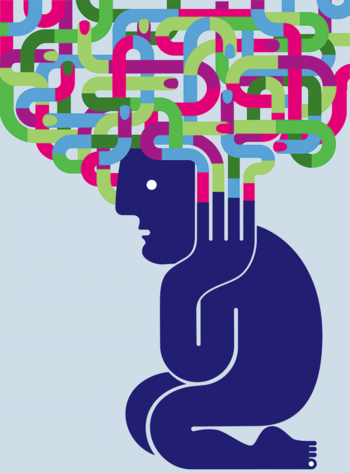Humans are secretive creatures, with brains adept at concealing information. Yet surprisingly little research has been done on the psychology of secrets — how common it is to have them and the toll they take on us.
“For a long time, secrecy was thought to be too difficult to study, in part because you’d have to get people to reveal their most closely guarded thoughts,” says Michael Slepian, a social psychologist and assistant professor of management at Columbia Business School.
But since 2015 Slepian has conducted a series of groundbreaking studies on the subject using a boldly simple strategy: he just asks people to confess their deepest secrets. His project, for which thousands of people have been surveyed, has generated several insights: for example, that 97 percent of US adults are concealing at least one uncomfortable fact about themselves at any given time; that most people have at least thirteen significant secrets weighing on them; and that the most secretive among us are less satisfied with our personal relationships, less productive at work, and at a higher risk for anxiety, depression, and other health problems.
“Going into this work, I wasn’t sure how forthcoming people would be,” says Slepian. “But our participants have been eager to open up. They want to unburden themselves.”
Many of the secrets divulged to Slepian’s team involve sex. The most common secret, they found, is having romantic thoughts about a person other than one’s partner. That is followed closely by cheating and various forms of emotional infidelity, like maintaining clandestine contact with an ex. Among the secrets that weigh the most heavily on people, the surveys show, are those that concern mental health, a past traumatic experience, and body image.
“The more we think our secrets reflect poorly on who we are, the more shame we feel and the more we ruminate on them,” says Slepian.
The researchers have also examined the psychological impact of keeping secrets. In the past, studies had suggested that highly secretive people are less happy because it is mentally exhausting to continually lie and censor oneself in social situations. But Slepian’s work has challenged this analysis, showing that for most people the stress of concealing secrets does not significantly affect their well-being. The real emotional burden of secrecy, he has found, is social isolation. “If there is a really important thing going on in your life but you have chosen to hold it back from other people, you are building a wall between yourself and others,” Slepian says. “This will make you feel alone and disconnected, which over time will take an emotional toll.”
Slepian’s research also suggests that this self-destructive habit can be broken: in yet another recent study, Slepian shows that if someone confesses a secret to at least one other person, he or she can find some relief. “Even if the secret is kept from everybody else, talking to one person about it can make a world of difference,” Slepian says. “With support and guidance, people can break the pattern of obsessive thinking and begin to cope with the secret.”
Slepian is working on several papers that explore the experience of secrecy from many angles, including one on how Americans who kept their support for Donald Trump or Hillary Clinton a secret from friends and family in 2016 were affected by the experience. Another paper explores the emotional costs of keeping a friend’s secret; yet another looks at the psychological profile of an ideal confidant.
“This is an exciting area,” Slepian says, “because it’s fairly uncharted territory.”



